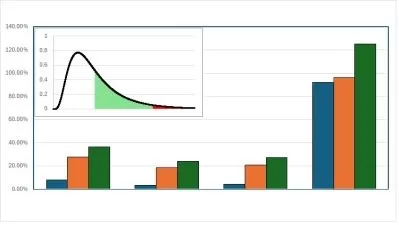Certified Quality Auditor (CQA) - Quality Management System
Bobish Kandy
8:15:45
Description
"Mastering Quality Auditing: A Comprehensive Guide to Quality Management Systems"
What You'll Learn?
- Quality and Auditing techniques
- Requirements of ISO 9001: Participants study the specific requirements outlined in the ISO 9001 standards
- ISO 9001 standard, including those related to leadership, planning, support, operation, performance evaluation, and improvement of the QMS.
- QMS Website Modules - QMS Implementation: Participants learn how to plan, develop, implement, and maintain a QMS based on ISO 9001 requirements
- Auditing Skills: Participants acquire auditing skills necessary to conduct internal audits of the organization's QMS
- learn audit planning, preparation, execution, and reporting techniques, as well as how to identify non-conformities and opportunities for improvement
- Continuous Improvement: Participants understand the importance of continual improvement in a QMS
- Identify areas for improvement, implement corrective and preventive actions, and measure the effectiveness of quality management processes
- Risk-based Thinking: Participants learn about the concept of risk-based thinking and its application in quality management.
- Understand how to identify, assess, and address risks and opportunities within the organization's processes and QMS
- Documentation and Record Keeping: Participants gain knowledge of the documentation and record-keeping requirements of ISO 9001
- Documentation and Record Keeping: Document control, record retention, and maintaining a documented QMS
- Roles and Responsibilities: Participants understand the roles and responsibilities of key stakeholders involved in the QMS
- Roles and Responsibilities: Top management, process owners, internal auditors, and other personnel.
- Case Studies and Practical Examples: Many ISO 9001 courses include case studies, practical examples, and interactive exercises to reinforce learning and demo
- Real-world applications of ISO 9001 principles and requirements.
- Understanding ISO 9001: Participants learn about the purpose, scope, and structure of the ISO 9001 standard
Who is this for?
What You Need to Know?
More details
Description1A. Foundations of Quality Management System
1A1. Quality Management System overview
1A2. Definitions of Quality
1A3. QMS - Principles
1A4. Objectives of Quality Management System
1A5. Importance of Quality
1A6. Evolution of quality management system concepts
1A7. ISO 9001 and the ISO 9000 series of standards
1A8. Road Map to Become a Quality Auditor
2A. QMS Overview and IOS 9001 Chapter / Clauses and its Uses in Audits
2A1. Explanation of Chapters-1-10
2A2. Chapter 1. Scope
2A3. Normative References
2A4. Terms and Definitions
04. Clause 4 - Context of the organization
05. Clause 5 - Leadership & Commitment
06. Clause 6 - Planning
07. Clause 7 - Support
08. Clause 8 - Operation
09. Clause 9 - Performance Evaluation
10. Clause 10 - Improvement
Describe the ISO 9001 Quality Management System (QMS)-Requirements standard and development process
Identify ISO 9000:20xx QMS terms
Describe the intent and requirements of ISO 9001:20xx
Determine the evidence needed to demonstrate conformity to ISO 9001:20xx
Apply the process approach and Plan-Do-Check-Act (PDCA) methodology
Evaluate documented information required by ISO 9001:20xx and the interrelationships between the quality processes, quality planning, policy, and objectives
Apply the principles, processes, and methods of auditing
Demonstrate the activities involved in preparing for an audit
Determine an effective audit in the context of the auditee’s organizational situation
Apply effective audit skills and practice personal behaviours necessary for an effective and efficient conduct of a management system audit
Establish and plan the activities of an audit team
Manage the audit process
Prepare the audit report and perform an audit follow-up
· Understanding ISO 9001: Participants learn about the purpose, scope, and structure of the ISO 9001 standard. They gain insight into the principles of quality management and the key concepts underlying ISO 9001 requirements.
· Requirements of ISO 9001: Participants study the specific requirements outlined in the ISO 9001 standard, including those related to leadership, planning, support, operation, performance evaluation, and improvement of the QMS.
· QMS Implementation: Participants learn how to plan, develop, implement, and maintain a QMS based on ISO 9001 requirements. This includes understanding the documentation requirements, defining processes, setting quality objectives, and establishing monitoring and measurement mechanisms.
· Auditing Skills: Participants acquire auditing skills necessary to conduct internal audits of the organization's QMS. They learn audit planning, preparation, execution, and reporting techniques, as well as how to identify non-conformities and opportunities for improvement.
· Continuous Improvement: Participants understand the importance of continual improvement in a QMS and learn how to identify areas for improvement, implement corrective and preventive actions, and measure the effectiveness of quality management processes.
· Risk-based Thinking: Participants learn about the concept of risk-based thinking and its application in quality management. They understand how to identify, assess, and address risks and opportunities within the organization's processes and QMS.
· Documentation and Record Keeping: Participants gain knowledge of the documentation and record-keeping requirements of ISO 9001, including document control, record retention, and maintaining a documented QMS.
· Roles and Responsibilities: Participants understand the roles and responsibilities of key stakeholders involved in the QMS, including top management, process owners, internal auditors, and other personnel.
· Case Studies and Practical Examples: Many ISO 9001 courses include case studies, practical examples, and interactive exercises to reinforce learning and demonstrate real-world applications of ISO 9001 principles and requirements.
Who this course is for:
- Quality Managers/Quality Assurance Professionals: Quality managers, quality assurance (QA) professionals etc.
- Internal Auditors: Internal auditors are individuals tasked with conducting internal audits of the organization's QMS to assess its effectiveness
- Process Owners/Managers: Process owners or managers responsible for specific processes within the organization's QMS
- Quality Engineers/Technicians: Quality engineers, technicians, or other technical staff involved in implementing and maintaining the QMS
- Consultants/Advisors: Consultants or advisors who work with organizations to implement or improve their QMS
- Management Representatives: Management representatives appointed to oversee the organization's QMS
- Employees Involved in Quality Improvement Initiatives: Employees involved in quality improvement initiatives or cross-functional teams responsible for QMS
1A. Foundations of Quality Management System
1A1. Quality Management System overview
1A2. Definitions of Quality
1A3. QMS - Principles
1A4. Objectives of Quality Management System
1A5. Importance of Quality
1A6. Evolution of quality management system concepts
1A7. ISO 9001 and the ISO 9000 series of standards
1A8. Road Map to Become a Quality Auditor
2A. QMS Overview and IOS 9001 Chapter / Clauses and its Uses in Audits
2A1. Explanation of Chapters-1-10
2A2. Chapter 1. Scope
2A3. Normative References
2A4. Terms and Definitions
04. Clause 4 - Context of the organization
05. Clause 5 - Leadership & Commitment
06. Clause 6 - Planning
07. Clause 7 - Support
08. Clause 8 - Operation
09. Clause 9 - Performance Evaluation
10. Clause 10 - Improvement
Describe the ISO 9001 Quality Management System (QMS)-Requirements standard and development process
Identify ISO 9000:20xx QMS terms
Describe the intent and requirements of ISO 9001:20xx
Determine the evidence needed to demonstrate conformity to ISO 9001:20xx
Apply the process approach and Plan-Do-Check-Act (PDCA) methodology
Evaluate documented information required by ISO 9001:20xx and the interrelationships between the quality processes, quality planning, policy, and objectives
Apply the principles, processes, and methods of auditing
Demonstrate the activities involved in preparing for an audit
Determine an effective audit in the context of the auditee’s organizational situation
Apply effective audit skills and practice personal behaviours necessary for an effective and efficient conduct of a management system audit
Establish and plan the activities of an audit team
Manage the audit process
Prepare the audit report and perform an audit follow-up
· Understanding ISO 9001: Participants learn about the purpose, scope, and structure of the ISO 9001 standard. They gain insight into the principles of quality management and the key concepts underlying ISO 9001 requirements.
· Requirements of ISO 9001: Participants study the specific requirements outlined in the ISO 9001 standard, including those related to leadership, planning, support, operation, performance evaluation, and improvement of the QMS.
· QMS Implementation: Participants learn how to plan, develop, implement, and maintain a QMS based on ISO 9001 requirements. This includes understanding the documentation requirements, defining processes, setting quality objectives, and establishing monitoring and measurement mechanisms.
· Auditing Skills: Participants acquire auditing skills necessary to conduct internal audits of the organization's QMS. They learn audit planning, preparation, execution, and reporting techniques, as well as how to identify non-conformities and opportunities for improvement.
· Continuous Improvement: Participants understand the importance of continual improvement in a QMS and learn how to identify areas for improvement, implement corrective and preventive actions, and measure the effectiveness of quality management processes.
· Risk-based Thinking: Participants learn about the concept of risk-based thinking and its application in quality management. They understand how to identify, assess, and address risks and opportunities within the organization's processes and QMS.
· Documentation and Record Keeping: Participants gain knowledge of the documentation and record-keeping requirements of ISO 9001, including document control, record retention, and maintaining a documented QMS.
· Roles and Responsibilities: Participants understand the roles and responsibilities of key stakeholders involved in the QMS, including top management, process owners, internal auditors, and other personnel.
· Case Studies and Practical Examples: Many ISO 9001 courses include case studies, practical examples, and interactive exercises to reinforce learning and demonstrate real-world applications of ISO 9001 principles and requirements.
Who this course is for:
- Quality Managers/Quality Assurance Professionals: Quality managers, quality assurance (QA) professionals etc.
- Internal Auditors: Internal auditors are individuals tasked with conducting internal audits of the organization's QMS to assess its effectiveness
- Process Owners/Managers: Process owners or managers responsible for specific processes within the organization's QMS
- Quality Engineers/Technicians: Quality engineers, technicians, or other technical staff involved in implementing and maintaining the QMS
- Consultants/Advisors: Consultants or advisors who work with organizations to implement or improve their QMS
- Management Representatives: Management representatives appointed to oversee the organization's QMS
- Employees Involved in Quality Improvement Initiatives: Employees involved in quality improvement initiatives or cross-functional teams responsible for QMS
User Reviews
Rating
Bobish Kandy
Instructor's Courses
Udemy
View courses Udemy- language english
- Training sessions 22
- duration 8:15:45
- Release Date 2024/11/17











